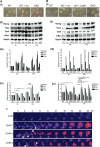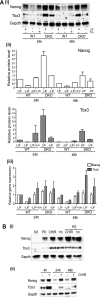Glycogen synthase kinase-3 inhibition enhances translation of pluripotency-associated transcription factors to contribute to maintenance of mouse embryonic stem cell self-renewal
- PMID: 23577087
- PMCID: PMC3618116
- DOI: 10.1371/journal.pone.0060148
Glycogen synthase kinase-3 inhibition enhances translation of pluripotency-associated transcription factors to contribute to maintenance of mouse embryonic stem cell self-renewal
Abstract
Maintenance of embryonic stem cell (ESC) self-renewal and pluripotency are controlled by extrinsic factors, molecular signaling pathways and transcriptional regulators. While many of the key players have been studied in depth, how the molecular signals interact with transcription factors of the pluripotency network to regulate their action remains less well understood. Inhibition of glycogen synthase kinase 3 (Gsk-3) has been implicated in the maintenance of mouse ESC pluripotency, although there is contradictory data on its role, with enhancement of cell survival and metabolism, stabilisation of c-Myc and activation of Wnt signalling proposed as potential mechanisms. We have discovered that suppression of Gsk-3 activity leads to enhanced protein levels of key transcriptional regulators of the pluripotency network, notably Nanog, Tbx3 and c-Myc. Protein stability was unchanged following Gsk-3 inhibition, although interestingly, Nanog and Tbx3 proteins were found to have half-lives of 1-3 h, while that of Oct4 protein was longer, at 6 h. We demonstrate that the effects on protein levels seen following inhibition of Gsk-3 are due to both enhanced de novo synthesis of Nanog protein and increases in the proportion of Nanog and Tbx3 RNAs bound to polysomes, findings consistent with Gsk-3 regulating translation of these factors. These effects were not due to changes in regulators of general translation initiation machinery nor mediated via the 5' or 3' UTR sequences of Nanog alone. The data we present provide both new conceptual insight into the mechanisms regulated by Gsk-3 that may contribute to ESC self-renewal and, importantly, establish control of protein translation as an additional mechanism involved in modulation of ESC pluripotency.
Conflict of interest statement
Figures







Similar articles
-
Regulation of Nanog expression by phosphoinositide 3-kinase-dependent signaling in murine embryonic stem cells.J Biol Chem. 2007 Mar 2;282(9):6265-73. doi: 10.1074/jbc.M610906200. Epub 2007 Jan 4. J Biol Chem. 2007. PMID: 17204467
-
Hesx1 enhances pluripotency by working downstream of multiple pluripotency-associated signaling pathways.Biochem Biophys Res Commun. 2015 Aug 28;464(3):936-42. doi: 10.1016/j.bbrc.2015.07.074. Epub 2015 Jul 15. Biochem Biophys Res Commun. 2015. PMID: 26188092
-
Opposing effects of Tcf3 and Tcf1 control Wnt stimulation of embryonic stem cell self-renewal.Nat Cell Biol. 2011 Jun 19;13(7):762-70. doi: 10.1038/ncb2283. Nat Cell Biol. 2011. PMID: 21685894 Free PMC article.
-
Nanog and transcriptional networks in embryonic stem cell pluripotency.Cell Res. 2007 Jan;17(1):42-9. doi: 10.1038/sj.cr.7310125. Cell Res. 2007. PMID: 17211451 Review.
-
Concise review: pursuing self-renewal and pluripotency with the stem cell factor Nanog.Stem Cells. 2013 Jul;31(7):1227-36. doi: 10.1002/stem.1384. Stem Cells. 2013. PMID: 23653415 Free PMC article. Review.
Cited by
-
Inductive and Selective Effects of GSK3 and MEK Inhibition on Nanog Heterogeneity in Embryonic Stem Cells.Stem Cell Reports. 2018 Jul 10;11(1):58-69. doi: 10.1016/j.stemcr.2018.04.019. Epub 2018 May 17. Stem Cell Reports. 2018. PMID: 29779897 Free PMC article.
-
Synthetic, non-saccharide, glycosaminoglycan mimetics selectively target colon cancer stem cells.ACS Chem Biol. 2014 Aug 15;9(8):1826-33. doi: 10.1021/cb500402f. Epub 2014 Jun 26. ACS Chem Biol. 2014. PMID: 24968014 Free PMC article.
-
Molecular Mechanisms Underlying Pluripotency and Self-Renewal of Embryonic Stem Cells.Int J Mol Sci. 2023 May 7;24(9):8386. doi: 10.3390/ijms24098386. Int J Mol Sci. 2023. PMID: 37176093 Free PMC article.
-
A competitive protein interaction network buffers Oct4-mediated differentiation to promote pluripotency in embryonic stem cells.Mol Syst Biol. 2013 Oct 8;9:694. doi: 10.1038/msb.2013.49. Mol Syst Biol. 2013. PMID: 24104477 Free PMC article.
-
Glycogen synthase kinase-3 (GSK-3) activity regulates mRNA methylation in mouse embryonic stem cells.J Biol Chem. 2018 Jul 6;293(27):10731-10743. doi: 10.1074/jbc.RA117.001298. Epub 2018 May 18. J Biol Chem. 2018. PMID: 29777057 Free PMC article.
References
-
- Boiani M, Schoeler HR (2005) Regulatory networks in embryo-derived pluripotent stem cells. Nat Rev Mol Cell Biol 6: 872–881. - PubMed
-
- Smith AG, Heath JK, Donaldson DD, Wong GG, Moreau J, et al. (1988) Inhibition of Pluripotential Embryonic Stem-Cell Differentiation by Purified Polypeptides. Nature 336: 688–690. - PubMed
Publication types
MeSH terms
Substances
Grants and funding
LinkOut - more resources
Full Text Sources
Other Literature Sources
Research Materials

